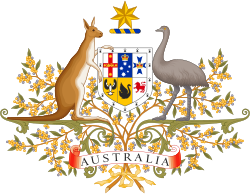Akiba v Commonwealth facts for kids
Quick facts for kids Akiba v Commonwealth |
|
|---|---|
 |
|
| Court | High Court of Australia |
| Full case name | Akiba on behalf of the Torres Strait Regional Seas Claim Group v Commonwealth of Australia |
| Decided | 7 August 2013 |
| Case history | |
| Prior action(s) | |
| Court membership | |
| Judge(s) sitting | French CJ, Hayne, Crennan, Kiefel and Bell JJ |
Akiba on behalf of the Torres Strait Regional Seas Claim Group v Commonwealth of Australia was a very important legal decision in Australia. It was made by the highest court in Australia, the High Court. This case was all about Native Title rights. Specifically, it looked at whether these rights could be extended to other people and if government laws could make them disappear.
Contents
What the Case Was About
A group of Torres Strait Islanders asked the Federal Court to confirm their native title rights. These rights were for a large area of the sea around the Torres Strait. They wanted to make sure their rights included fishing to sell and trade.
The Commonwealth and Queensland State Government disagreed. They said that native title rights were like a "bundle" of different rights. They argued that if the government made laws about fishing, like needing a license, then some of these native title rights, especially the right to fish for sale, would be taken away. This is called "extinguishment" in law.
The Torres Strait Islanders argued that the government never meant to take away their native title. They said that fishing licenses only controlled how they fished, not if they could fish for money. They also pointed out that the government had even helped Islanders start fishing businesses.
Decisions in Lower Courts
The first judge, Justice Finn, mostly agreed with the Torres Strait Islanders. He said they had proven their native title rights.
However, the Commonwealth government appealed this decision. A higher court, the Full Federal Court, partly agreed with the government. They said that the native title rights did not include the right to fish for sale or trade. One judge, Justice Mansfield, disagreed with this part.
Because of this, the Torres Strait Islanders then appealed to the High Court of Australia.
The High Court's Decision
The High Court looked at the case and decided in favor of the Torres Strait Islanders. All the judges agreed. They said that the old fishing laws from 1887 and 1952, which required fishing licenses, did not take away the Islanders' connection to the land and sea. These laws also did not remove their native title rights.
The judges explained that just because a law controls an activity, it doesn't mean the original right is gone. For example, a law might say you need a license to drive a car. This doesn't mean you no longer have the right to travel. It just means you need to follow certain rules to do it.
The High Court said that the main question was whether the native title activity (like fishing) could still happen even with the government's laws. They found that the laws regulated fishing but did not stop the native title right to fish from existing. The purpose of taking the fish (whether for food or for sale) was not the main issue.
Other Claims for Rights
Some other people also tried to claim rights in this case. These were people who had family or trading connections with the native title holders. They wanted their rights to be recognized too.
The court said that while these relationships were very important under Islander culture, they were personal rights. They were not rights over the waters themselves. So, the court did not recognize these as native title rights over the sea.
See also
 | Precious Adams |
 | Lauren Anderson |
 | Janet Collins |

